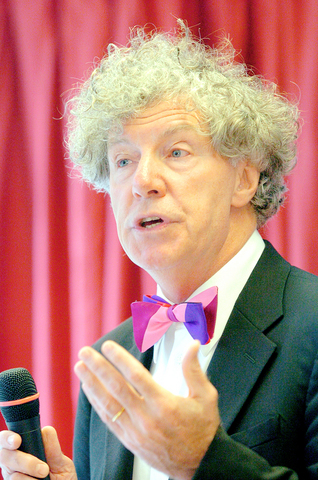Democracy is an extraordinary invention and viewing it from a humble perspective is an innovative way to safeguard existing democracies, a visiting academic from the UK said yesterday.
John Keane, a professor of politics at the UK's University of Westminster, suggested a theory of "humble democracy." Unlike dictatorships, which nurture monopolies of power, humble democracy fosters the understanding that multiple forms of democracy are possible, he said.
Keane, ranked by London's Times newspaper as one of Britain's leading political thinkers, was invited by the Taiwan Foundation for Democracy to deliver a lecture titled "Why Democracy? Considerations on an Old Ideal in Need of New Life" yesterday at the foundation.

PHOTO: SEAN CHAO, TAIPEI TIMES
In introducing Keane, Michael Hsiao (蕭新煌), standing supervisor of the foundation and a national policy adviser to the president, talked about the importance of understanding the meaning of democracy.
"The foundation feels the need to let all the people of Taiwan understand the reason our country needs democracy and search for solutions to fight for the survival of democracy in Taiwan," Hsiao said.
Keane praised Taiwan as having a more modest and humble form of democracy than the US, where political leaders often cite "God" in saying that all nations are entitled to democracy.
Keane also noted the challenges Taiwan faces.
"At the cutting edge of the problem of how democracies can survive, Taiwan must grapple with the problem of how to nurture and sustain its democracy in a difficult geopolitical environment," Keane said.
All mature democracies are suffering the symptoms of aging and degeneration, he said.
"What is needed ... is a democratic way of thinking about the advantages of democracy," Keane said.
"Instead of thinking of democracy as true and right, humble democracy sees democracy as the best political weapon for publicly humbling armies, governments, parties and corporations," he said.

ANOTHER EMERGES: The CWA yesterday said this year’s fourth storm of the typhoon season had formed in the South China Sea, but was not expected to affect Taiwan Tropical Storm Gaemi has intensified slightly as it heads toward Taiwan, where it is expected to affect the country in the coming days, the Central Weather Administration (CWA) said yesterday. As of 8am yesterday, the 120km-radius storm was 800km southeast of Oluanpi (鵝鑾鼻), Taiwan’s southernmost tip, moving at 9kph northwest, the agency said. A sea warning for Gaemi could be issued tonight at the earliest, it said, adding that the storm is projected to be closest to Taiwan on Wednesday or Thursday. Gaemi’s potential effect on Taiwan remains unclear, as that would depend on its direction, radius and intensity, forecasters said. Former Weather Forecast

As COVID-19 cases in Japan have been increasing for 10 consecutive weeks, people should get vaccinated before visiting the nation, the Centers for Disease Control (CDC) said. The centers reported 773 hospitalizations and 124 deaths related to COVID-19 in Taiwan last week. CDC Epidemic Intelligence Center Director Guo Hung-wei (郭宏偉) on Tuesday said the number of weekly COVID-19 cases reported in Japan has been increasing since mid-May and surpassed 55,000 cases from July 8 to July 14. The average number of COVID-19 patients at Japan’s healthcare facilities that week was also 1.39 times that of the week before and KP.3 is the dominant

The Chinese Communist Party’s (CCP) working group for Taiwan-related policies is likely to be upgraded to a committee-level body, a report commissioned by the Mainland Affairs Council (MAC) said. As Chinese President Xi Jinping (習近平) is increasingly likely to upgrade the CCP’s Central Leading Group for Taiwan Affairs, Taiwanese authorities should prepare by researching Xi and the CCP, the report said. At the third plenary session of the 20th Central Committee of the CCP, which ended on Thursday last week, the party set a target of 2029 for the completion of some tasks, meaning that Xi is likely preparing to

US-CHINA TRADE DISPUTE: Despite Beijing’s offer of preferential treatment, the lure of China has dimmed as Taiwanese and international investors move out Japan and the US have become the favored destinations for Taiwanese graduates as China’s attraction has waned over the years, the Ministry of Labor said. According to the ministry’s latest income and employment advisory published this month, 3,215 Taiwanese university graduates from the class of 2020 went to Japan, surpassing for the first time the 2,881 graduates who went to China. A total of 2,300 graduates from the class of 2021 went to the US, compared with the 2,262 who went to China, the document showed. The trend continued for the class of 2023, of whom 1,460 went to Japan, 1,334 went to